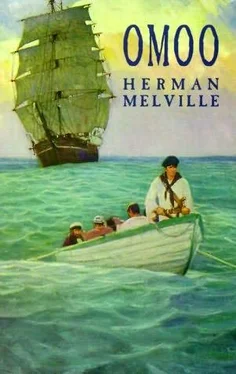Herman Melville - Omoo - Adventures in the South Seas
Здесь есть возможность читать онлайн «Herman Melville - Omoo - Adventures in the South Seas» весь текст электронной книги совершенно бесплатно (целиком полную версию без сокращений). В некоторых случаях можно слушать аудио, скачать через торрент в формате fb2 и присутствует краткое содержание. Жанр: Классическая проза, на английском языке. Описание произведения, (предисловие) а так же отзывы посетителей доступны на портале библиотеки ЛибКат.
- Название:Omoo: Adventures in the South Seas
- Автор:
- Жанр:
- Год:неизвестен
- ISBN:нет данных
- Рейтинг книги:3 / 5. Голосов: 1
-
Избранное:Добавить в избранное
- Отзывы:
-
Ваша оценка:
- 60
- 1
- 2
- 3
- 4
- 5
Omoo: Adventures in the South Seas: краткое содержание, описание и аннотация
Предлагаем к чтению аннотацию, описание, краткое содержание или предисловие (зависит от того, что написал сам автор книги «Omoo: Adventures in the South Seas»). Если вы не нашли необходимую информацию о книге — напишите в комментариях, мы постараемся отыскать её.
Omoo: Adventures in the South Seas — читать онлайн бесплатно полную книгу (весь текст) целиком
Ниже представлен текст книги, разбитый по страницам. Система сохранения места последней прочитанной страницы, позволяет с удобством читать онлайн бесплатно книгу «Omoo: Adventures in the South Seas», без необходимости каждый раз заново искать на чём Вы остановились. Поставьте закладку, и сможете в любой момент перейти на страницу, на которой закончили чтение.
Интервал:
Закладка:
The scenery around was delightful. The tropical day was fast drawing to a close; and from where we were, the sun looked like a vast red fire burning in the woodlands-its rays falling aslant through the endless ranks of trees, and every leaf fringed with flame. Escaped from the confined decks of the frigate, the air breathed spices to us; streams were heard flowing; green boughs were rocking; and far inland, all sunset flushed, rose the still, steep peaks of the island.
As we proceeded, I was more and more struck by the picturesqueness of the wide, shaded road. In several places, durable bridges of wood were thrown over large water-courses; others were spanned by a single arch of stone. In any part of the road, three horsemen might have ridden abreast.
This beautiful avenue-by far the best thing which civilization has done for the island-is called by foreigners "the Broom Road," though for what reason I do not know. Originally planned for the convenience of the missionaries journeying from one station to another, it almost completely encompasses the larger peninsula; skirting for a distance of at least sixty miles along the low, fertile lands bordering the sea. But on the side next Taiarboo, or the lesser peninsula, it sweeps through a narrow, secluded valley, and thus crosses the island in that direction.
The uninhabited interior, being almost impenetrable from the densely-wooded glens, frightful precipices, and sharp mountain ridges absolutely inaccessible, is but little known, even to the natives themselves; and so, instead of striking directly across from one village to another, they follow the Broom Road round and round.
It is by no means, however, altogether travelled on foot; horses being now quite plentiful. They were introduced from Chili; and possessing all the gaiety, fleetness, and docility of the Spanish breed, are admirably adapted to the tastes of the higher classes, who as equestrians have become very expert. The missionaries and chiefs never think of journeying except in the saddle; and at all hours of the day you see the latter galloping along at full speed. Like the Sandwich Islanders, they ride like Pawnee-Loups.
For miles and miles I have travelled the Broom Road, and never wearied of the continual change of scenery. But wherever it leads you-whether through level woods, across grassy glens, or over hills waving with palms-the bright blue sea on one side, and the green mountain pinnacles on the other, are always in sight.
CHAPTER XXXI
THE CALABOOZA BERETANEE
ABOUT a mile from the village we came to a halt.
It was a beautiful spot. A mountain stream here flowed at the foot of a verdant slope; on one hand, it murmured along until the waters, spreading themselves upon a beach of small, sparkling shells, trickled into the sea; on the other was a long defile, where the eye pursued a gleaming, sinuous thread, lost in shade and verdure.
The ground next the road was walled in by a low, rude parapet of stones; and, upon the summit of the slope beyond, was a large, native house, the thatch dazzling white, and in shape an oval.
"Calabooza! Calabooza Beretanee!" (the English Jail), cried our conductor, pointing to the building.
For a few months past, having been used by the consul as a house of confinement for his refractory sailors, it was thus styled to distinguish it from similar places in and about Papeetee.
Though extremely romantic in appearance, on a near approach it proved hut ill adapted to domestic comfort. In short, it was a mere shell, recently built, and still unfinished. It was open all round, and tufts of grass were growing here and there under the very roof. The only piece of furniture was the "stocks," a clumsy machine for keeping people in one place, which, I believe, is pretty much out of date in most countries. It is still in use, however, among the Spaniards in South America; from whom, it seems, the Tahitians have borrowed the contrivance, as well as the name by which all places of confinement are known among them.
The stocks were nothing more than two stout timbers, about twenty feet in length, and precisely alike. One was placed edgeways on the ground, and the other, resting on top, left, at regular intervals along the seam, several round holes, the object of which was evident at a glance.
By this time, our guide had informed us that he went by the name of "Capin Bob" (Captain Bob); and a hearty old Bob he proved. It was just the name for him. From the first, so pleased were we with the old man that we cheerfully acquiesced in his authority.
Entering the building, he set us about fetching heaps of dry leaves to spread behind the stocks for a couch. A trunk of a small cocoa-nut tree was then placed for a bolster-rather a hard one, but the natives are used to it. For a pillow, they use a little billet of wood, scooped out, and standing on four short legs-a sort of head-stool.
These arrangements completed, Captain Bob proceeded to "hanna-par," or secure us, for the night. The upper timber of the machine being lifted at one end, and our ankles placed in the semicircular spaces of the lower one, the other beam was then, dropped; both being finally secured together by an old iron hoop at either extremity. This initiation was performed to the boisterous mirth of the natives, and diverted ourselves not a little.
Captain Bob now bustled about, like an old woman seeing the children to bed. A basket of baked "taro," or Indian turnip, was brought in, and we were given a piece all round. Then a great counterpane of coarse, brown "tappa," was stretched over the whole party; and, after sundry injunctions to "moee-moee," and be "maitai"-in other words, to go to sleep, and be good boys-we were left to ourselves, fairly put to bed and tucked in.
Much talk was now had concerning our prospects in life; but the doctor and I, who lay side by side, thinking the occasion better adapted to meditation, kept pretty silent; and, before long, the rest ceased conversing, and, wearied with loss of rest on board the frigate, were soon sound asleep.
After sliding from one reverie into another, I started, and gave the doctor a pinch. He was dreaming, however; and, resolved to follow his example, I troubled him no more.
How the rest managed, I know not; but for my own part, I found it very hard to get to sleep. The consciousness of having one's foot pinned; and the impossibility of getting it anywhere else than just where it was, was most distressing.
But this was not all: there was no way of lying but straight on your back; unless, to be sure, one's limb went round and round in the ankle, like a swivel. Upon getting into a sort of doze, it was no wonder this uneasy posture gave me the nightmare. Under the delusion that I was about some gymnastics or other, I gave my unfortunate member such a twitch that I started up with the idea that someone was dragging the stocks away.
Captain Bob and his friends lived in a little hamlet hard by; and when morning showed in the East, the old gentleman came forth from that direction likewise, emerging from a grove, and saluting us loudly as he approached.
Finding everybody awake, he set us at liberty; and, leading us down to the stream, ordered every man to strip and bathe.
"All han's, my boy, hanna-hanna, wash!" he cried. Bob was a linguist, and had been to sea in his day, as he many a time afterwards told us.
At this moment, we were all alone with him; and it would have been the easiest thing in the world to have given him the slip; but he seemed to have no idea of such a thing; treating us so frankly and cordially, indeed, that even had we thought of running, we should have been ashamed of attempting it. He very well knew, nevertheless (as we ourselves were not slow in finding out), that, for various reasons, any attempt of the kind, without some previously arranged plan for leaving the island, would be certain to fail.
Читать дальшеИнтервал:
Закладка:
Похожие книги на «Omoo: Adventures in the South Seas»
Представляем Вашему вниманию похожие книги на «Omoo: Adventures in the South Seas» списком для выбора. Мы отобрали схожую по названию и смыслу литературу в надежде предоставить читателям больше вариантов отыскать новые, интересные, ещё непрочитанные произведения.
Обсуждение, отзывы о книге «Omoo: Adventures in the South Seas» и просто собственные мнения читателей. Оставьте ваши комментарии, напишите, что Вы думаете о произведении, его смысле или главных героях. Укажите что конкретно понравилось, а что нет, и почему Вы так считаете.












